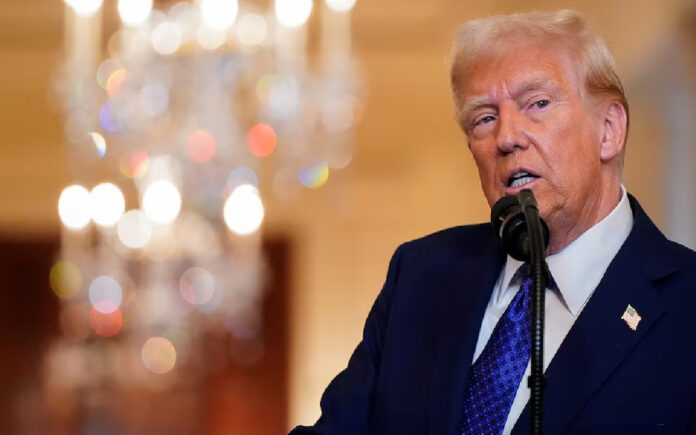Washington: U.S. President Donald Trump announced on Friday that his administration will impose steep tariffs of 25% on imports from Mexico and Canada and 10% on goods from China, emphasizing that nothing could prevent the measures from taking effect.
However, Trump suggested a potential exemption for Canadian oil, specifying that it would be subject to a 10% tariff instead of the 25% applied to other Canadian goods. He also hinted at broader tariffs on oil and natural gas set to take effect in mid-February, a statement that immediately influenced global oil prices.
Trump has repeatedly warned of the impending tariffs, scheduled to begin on February 1, asserting they will remain in place until the three nations take stronger action to curb the influx of migrants and fentanyl into the United States. Speaking from the Oval Office while signing executive orders, he acknowledged that the tariffs could lead to short-term disruptions and increased consumer costs. Economists predict these sweeping import taxes, along with expected retaliatory measures, could significantly impact global economic activity.
When asked if there was any possibility of delaying the tariffs, Trump firmly responded, “No, no. Not right now, no.”
He dismissed claims that his tariff threats were merely a negotiation tactic, stating, “No, it’s not … we have big [trade] deficits with, as you know, with all three of them.”
“It’s something we’re doing, and we’ll possibly very substantially increase it, or not, we’ll see how it is,” Trump added. “But it’s a lot of money coming to the United States.”
The president also signaled that additional tariffs are being considered on European goods, as well as on materials such as steel, aluminum, and copper, and on products including pharmaceuticals and semiconductors.
“We’re going to be putting tariffs on steel and aluminum, and ultimately copper. Copper will take a little longer,” Trump said.
Financial markets reacted sharply to Trump’s statements, with the Canadian dollar and Mexican peso weakening, Treasury bond yields rising, and stock markets closing lower. Despite the market fluctuations, Trump appeared unconcerned about the financial sector’s response to his trade policy.
White House spokesperson Karoline Leavitt confirmed the tariffs, stating, “The President will be implementing tomorrow 25% tariffs on Mexico, 25% tariffs on Canada, and a 10% tariff on China for the illegal fentanyl that they have sourced and allowed to distribute into our country, which has killed tens of millions of Americans.” She added that more details would be provided on Saturday.
When Trump previously imposed tariffs on Chinese imports in 2018 and 2019, there was typically a delay of two to three weeks before U.S. Customs and Border Protection began enforcement due to system updates and procedural requirements.
Later on Friday, Trump traveled to his Mar-a-Lago estate in Florida, where he said he would be working over the weekend. He was accompanied by Howard Lutnick, his nominee for commerce secretary, who is also expected to lead U.S. trade policy.
Economic Disruptions and Retaliatory Threats
Economists and industry leaders have cautioned that the tariffs will lead to higher prices on various imports, including aluminum, lumber, and motor vehicles from Canada, as well as fruits, vegetables, beer, and electronics from Mexico.
Trump reiterated his claim that the tariffs would generate billions of dollars in revenue for the United States. However, economists argue that the costs of tariffs are largely borne by importing businesses, which often pass the expenses onto consumers.
“President Trump’s tariffs will tax America first,” said Matthew Holmes, public policy chief at the Canadian Chamber of Commerce. “From higher costs at the pumps, grocery stores, and online checkout, tariffs cascade through the economy and end up hurting consumers and businesses on both sides of the border.”
Also Read | Medevac Plane Crashes in Philadelphia with Six on Board, Including Child
The tariffs are expected to trigger retaliatory measures, potentially disrupting over $2.1 trillion in annual U.S. trade with its three largest partners. Canadian Prime Minister Justin Trudeau vowed to respond swiftly, warning that “Canadians could be facing difficult times in the coming days and weeks.”
A source familiar with Canada’s plan revealed that immediate countermeasures would include tariffs on Florida orange juice. Canada is also considering a broader list of U.S. imports worth up to C$150 billion ($105 billion) but will conduct public consultations before finalizing the response.
Also Read | Who’s Liable? Washington Air Crash and the Limits of Government Responsibility
Mexican President Claudia Sheinbaum said she would “wait with a cool head” for Trump’s tariff decision while continuing diplomatic discussions. She previously warned that Mexico would retaliate, arguing that the tariffs could result in the loss of 400,000 U.S. jobs and lead to price hikes for American consumers.
China has yet to disclose specific retaliation plans but has made it clear it will respond. A spokesperson for Beijing’s embassy in Washington stated, “China firmly opposes Trump’s new duties… There is no winner in a trade war or tariff war, which serves the interests of neither side nor the world.”



